- Home
- Sam Siciliano
The White Worm Page 4
The White Worm Read online
Page 4
I suddenly remembered where I had read about such a bed: Emily Brontë’s Wuthering Heights. The narrator had started the night in a similar room on the Yorkshire moors, only to be visited by Catherine Linton’s ghost who begged to come inside. I had last remembered the novel when I was at Grimswell Hall on Dartmoor, a similar setting. “No ghosts appeared then, and none will appear now,” I told myself. All the same, I missed Michelle. One of the privileges of marriage I most valued was having her sleeping beside me during the night, near enough to touch.
I was too weary for reflection and quickly fell asleep. Blurry gray landscapes slipped by, fields and woods, small villages, and the sounds of wind and lashing rain wove themselves in and out of my dreams. The abbey stood on its hill, black against a moonlit sky, and some huge white thing slithered round and hid behind the dark stones. No, no. Gradually the storm abated, and my sleep grew less restless.
When I awoke, it took me a moment to recall where I was. It was quiet, far more quiet than ever possible in London, but then I heard the distant cawing of crows. I sighed, then sat up and set my elbow on the window ledge. The sky was a clear cloudless blue. I found my watch. It was nearly seven, and the sun would have risen before five. I dressed, putting on an informal gray tweed walking suit and black lace-up walking boots, then went downstairs.
Holmes and Selton were already up. The usual enormous country breakfast laid out in silver trays, much of which would be wasted, was lacking. Instead, Selton asked me if a rasher of bacon and some scrambled eggs would suit me, and Mrs. Childes soon brought me a plate. After I had eaten, we lingered over coffee.
“When are your mother and father expected?” Holmes asked.
“Tomorrow or the next day.” Selton had a face that seemed incapable of deceit, his every emotion obvious. He was not happy they were coming. “I hope my father does not try to make trouble with you, Mr. Holmes. It’s my money, after all, and I may spend it as I wish. You will… you will support me, won’t you?”
Holmes nodded. “I certainly shall, Mr. Selton. You may count on that. It is peaceful here at Lesser Hill. The house might sleep twenty, but I take it that just now it is only you, Evans, Mrs. Childes, and the housemaid?”
“Her name is Anne. Yes. I have no need of more servants.”
“Although I suspect your parents will not be alone.”
“Oh no, there will of course be my father’s valet, my mother’s maid, a different and much worse cook, the family butler, and two more housemaids.”
I laughed. “They travel in state, do they?”
Selton nodded grimly and set down his cup. “Let me show you round a little, and then we can start for Diana’s Grove. Do you mind walking or would you rather take the wagonette?”
“I would love to walk,” I said, and Holmes nodded.
We went out the front door. The trees, set in a kind of miniature park, looked completely different in daylight. Their dark limbs were covered with moss and lichens, and the leaves, which were just beginning to bud, were small and yellow-green. We could hear the distant murmur of the sea, and as we went round the house, the sound grew louder. Before us was a grassy slope, a wet shining green under the vast blue sky, and the murmur became more a roar. The sharp cries of gulls rose over the sound of the sea, and I saw two of them circle upward. We followed a small path to the top of the rise.
“Good Lord,” I murmured.
The earth dipped downward, the green grass swept flat by the wind, and about twenty yards away was a drop, and then the deep blue-green sea extending out to the distant horizon. To the left and north, the coast curved inward and round to a distant hill covered in trees, the white limestone cliffs along the way falling a good hundred feet to a beach of gray shingle. The tide must have come in, and the waves washed all white and foaming across the pebbles, left them black and glistening as the sea withdrew. To the south, the grass-covered earth curved round again, with more cliffs visible, and rose to another hill, this one even higher and barren. Upon it, a gray square tower rose above a stone dwelling.
The sun felt warm, but the light wind coming off the sea was cold. I could only imagine what it must have been like during the storm the night before. In a real maelstrom, one could probably not even stand at this scenic point.
Holmes was wearing an informal brown tweed suit, and the brim of his walking hat shaded his eyes. He held a gnarled walking stick, a blackthorn, nothing like his usual London one with its brass head, and he pointed its tip toward the north. “That must be Diana’s Grove.” He turned to the south. “And that Doom Tower.”
“Exactly so, Mr. Holmes.”
“Is there a way down to the beach?”
“There is. A small rocky path which winds down along the cliffs.”
I could not repress a shiver, and Holmes smiled.
Selton was puzzled. “What is it?” he asked.
“Henry suffers from vertigo,” Holmes said. “He does not care for heights.”
“That’s a shame. The beach is well worth a visit. I like to watch the waves come in and out and hear the ocean and the gulls.”
Holmes nodded, smiling. “So do I.”
Selton looked genuinely concerned. “There is another path down from Diana’s Grove. It’s not so steep and goes through the trees. I think perhaps you could manage it.”
I smiled. “Thank you. You are very kind.”
Holmes set his stick against his shoulder and turned toward Diana’s Grove. “Shall we be on our way?”
It was a beautiful morning. The path didn’t amount to much. Luckily for me, it mostly avoided the sheer cliffs. To our left, inland, we could see the earth rising upward to a distant hill, upon which perched a castle that must have an even more spectacular view. Lower down were green fields and some scattered woods, higher up was the bleaker moorland, topped with brown heather. In late summer when it bloomed, all would be awash with pinks and purples, but now the moors looked desolate as the dark sea and the rocky cliffs. A gull soared out past the edge, cried out twice, then swung inward, rising higher before it began flapping toward the distant hill inland.
None of us felt like conversation. For the first time, Selton seemed truly comfortable, at home and in his element. The awkwardness and unease which hovered about him in London and in the train compartment had vanished. He was a giant of a man, but impossibly, he seemed to have grown even larger. His stride was enormous. He would get ahead of us, then politely slow down again. I was a fast walker, but I don’t think I could have kept up with him if he were truly in a hurry.
At the edge of Diana’s Grove, on a sheltered inland knoll, stood an enormous oak, the massive trunk easily ten feet across, with a swollen bulbous node another two or three feet wide about six feet up. Half the tree was budding, while the other half appeared almost dead. All the branches were black and twisted. We stopped to admire it.
“That tree must be a century old at least,” I said.
Selton nodded. “They say it is two or three hundred years old.”
“Amazing. It has such character.” Holmes shook his head and started forward.
Something reddish-brown flashed across the path, swirled sideways past the trunk and vanished round the other side. Another sprang on to the path, stopped, then regarded us warily. The red squirrel had splendid tufted ears and a huge puffy tail. Its nose twitched at us, even as it shook its tail. It looked toward the tree, then back again.
“Look at the size of that thing,” I said. “I’ve never seen such a large one.”
The squirrel bounded to the side and ran around the tree. The first squirrel popped its head out, then each made a quick circuit round the trunk. They went up the side, the big one chasing the other, who went flying off one limb onto another tree without slowing in the least. The big one followed, and then they both gamboled off into the woods, their red tails waving.
“Hide and seek,” Selton said.
I smiled. “Or perhaps some mating ritual.”
Selton gave me a h
ard stare, obviously finding my reflection distasteful. He started forward into the woods. Though many of the trees were still bare, the leaves were not completely out, but it was dimmer and quieter, the ocean sound muted. The shade about us felt cold. Growing amidst the tree trunks were sparse clumps of green grass and various ferns, some with large shaggy yellowish fronds. On the black and white rocks grew brilliant mosses of different shades of green, brown and red. Selton strode ahead of us, and we could hear him taking in great long breaths, then easing the air out.
Someone sprang out before us, a radiant-looking, young, red-headed woman all in blue who raised a long white finger to her lips, silently shushing Holmes and me. She lowered her hand even as her smile grew. She rose up on her toes, then whirled about and rushed toward Selton. “Surprise!” she shouted.
He stopped and swung round. His stern face slowly eased into a smile. “Wanted to startle me, did you?” She was tall, but in his coarse woolen jacket and hat with its wide brim, he had nearly a foot over her.
“I did startle you—admit it!”
“I heard you coming. You made too much noise.”
“You didn’t—you didn’t. I could tell. Natty Bumppo or Chingachgook could have done no better. You were surprised!”
His smile grew. “All right, I was surprised.”
“You deserve it! You left without saying goodbye or telling me when you might return or anything! I was—I was worried!”
“I’m sorry, but it was—it was business.”
“Promise you won’t do it again—don’t go without telling me.”
“Diana…”
“Promise.”
“Oh, very well, I promise.” He gave us an embarrassed glance.
She had had her back to us, but now she turned. “And who are these gentlemen?”
“They are… come up from London to stay with me.” He bit warily at his lower lip. “Mr. Sherlock Holmes and Dr. Henry Vernier.”
She gave us a slight curtsey. “Pleased to meet you, sirs.” Clearly she had never heard of Sherlock Holmes.
Her smile was somewhat lopsided because of a dimple on her right cheek, but unrestrained and exuberant. She had another dimple, a permanent one, in the center of her chin. A swirling tangle of red hair surrounded her thin white face and spilled down on to her shoulders. She wore a practical sort of heavy woolen skirt and jacket for the outdoors, which were, nevertheless, as I have mentioned, a brilliant blue. I could not help but think of Michelle—this might be her cousin, or even younger sister. They had the same pale complexion and fiery hair. And also like Michelle, I could tell she did not believe in corsets. (I fear I have an eye for such things.) However, Miss Marsh was much younger, more slender still, without yet a woman’s fullness, and her eyes were an amazing green, rather than blue. But as Selton had remarked, she did have a woman’s shape, even without the corset.
She was not wearing gloves; nor was Selton. She suddenly reached out and took his enormous hand between her white, slender fingers and clasped it tightly. “Oh, Adam—I’m so glad to see you again!”
I gave my head a slight shake. I didn’t know if Selton really cared for her, but she was certainly smitten. He did seem to bask in the glow of her approval.
She glanced at us. “It’s too early for tea or lunch, but I can show you round Diana’s Grove. And you must meet Aunt Arabella.” She swung back round and grasped Selton’s upper arm, directing him forward. “What was this business? What’s so important, anyway, that you had to just disappear like that?”
“Diana…” he rumbled. “Business, as I said. Confidential. I…”
“Oh, all right—just don’t do it again. Promise me.”
The path wound through the trees, but we came at last to a wider, graveled road, ten feet across, which seemed to be a formal entryway for carriages. The two young people turned to follow it. Miss Marsh was still talking rapidly, but I could not make out all the words. Once her hand slipped down furtively to give his hand a quick squeeze, then rose again to grasp his arm just above the elbow. I glanced at Holmes. A faint smile tugged at his lips. They made me feel centuries old, but they were rather endearing.
We passed another side path leading into the trees. Holmes raised his stick. “Miss Marsh, where does that path lead?”
“That? Oh, it goes north to a clearing with some ancient standing stones overlooking the sea. There’s also a big hole in the ground.”
“Hole in the ground?” I asked.
“Actually, I think the pit is supposed to be boarded up. They say the Celts sacrificed people there. Mummy and Papa used to tell me scary stories and forbade me to go there because it was unsafe for a child. Grandpa didn’t say much, but he never went there himself.” She turned, resumed walking, and we all followed.
The road curved and rose, and before us through the slender tree trunks we could see the huge shape of the house, no doubt constructed of the local limestone which had weathered to black, white and gray over the years. Three rows of elaborate arched windows were on either side of the entrance, and the roof had gothic-style abutments and jutting spires. As we came closer, we could see that several window panes were cracked, one was even missing, and the slate tiles along one side of the roof seemed broken.
The road ended in a grassy clearing round the house. Holmes was just ahead of me, looking to and fro as he walked, but he came to a sudden halt, his eyes fixed to the right. I turned that way. “Lord!” I exclaimed.
Two long forms slithered rapidly round each other in the grass, a darker one and a lighter one, both marked with a vivid zigzag pattern, their scales glistening in the sun. “Blasted vermin,” Selton said. He stepped forward, raising his stick like a cudgel.
“Wait!” Holmes cried, seizing his wrist.
The two snakes retreated incredibly fast, vanishing into the woods. “Why did you stop me?” Selton exclaimed. “Those were adders! They are poisonous. Can’t have them lurking about.”
“They will not attack people unless greatly provoked. I have a certain fondness for reptiles and spiders, although I know many people have a revulsion to them. Perhaps that fear is instinctual, but it can be overcome by reflection and familiarity with the animals. After all, they form a part of the great web of the natural world and provide a useful function. Those adders help to keep vermin like rats and mice in check.”
Selton shook his head, still scowling.
“Bravo, sir—bravo.” A woman stood before the entranceway, and she clapped her hands together in mock applause. “I have never heard it put more sensibly.”
We walked forward toward the towering doors. Carved in stone just overhead was a knight in the process of cutting off a serpentine dragon’s head, the relief badly weathered. The woman had to be the aunt. Her silken gown with its elaborate white and ivory pattern showed off her slender waist (she was a believer in corsets), but it would have been more suitable for a London townhouse than the Yorkshire countryside. Her hair was the same shade of red as her niece’s, but tightly bound up, thus showing off her slender white neck and face. Her nose was slight and turned up (another similarity), her mouth full. I suspected she also had green eyes, but I could not tell because her gold-framed spectacles had octagonal lenses of green glass.
Green had been a popular color for lenses when I was a child, but had fallen out of favor, replaced by blue. As a physician, I was familiar with the arguments for blue, green, gray or orange lenses, but I thought that clear glass, which was now most common, worked as well as anything. Lady Verr was a beautiful woman (as she clearly knew), but the spectacles did give her an oddly antiquated look. About her throat was a splendid golden necklace with three large emeralds at the center. She descended two stone steps, one of which had crumbled at the end, and approached us. Tight white leather gloves covered her long, slender fingers.
“How good to see you, Adam. And who are these two gentlemen? I am especially interested in this defender of the serpentine race.”
Selton looked wary again. “H
e is Mr. Sherlock Holmes, and this is—”
“Dr. Watson!” she exclaimed.
I shook my head. “No. I am Dr. Henry Vernier, Mr. Holmes’s cousin.”
Her forehead knotted up. “But you are not in the stories.”
Holmes smiled. “Madam, they are, after all, only stories. Dr. Watson and I are not quite so close as he has portrayed. In fact, Henry is my preferred companion.”
“This is Lady Verr,” Selton said.
She lifted her copious skirts with her right hand, bowing gracefully. As she swung round, I realized she was wearing a full bustle under the white dress, the most outlandish of fashions which had finally—thankfully!—gone out of style in the last year or two. Michelle had an absolute horror of these grotesque contraptions of metal abutting the posterior: they make women resemble centaurs, completely destroying their natural shape.
Miss Marsh’s smooth perfect forehead had been creased during our exchange, obviously puzzled. Her aunt noticed her expression. “Have you not heard of Mr. Sherlock Holmes, Diana?”
“Indeed, I have not.”
“He is a consulting detective, the most famous in England, whose adventures have been recounted in several volumes by Dr. John Watson.”
“With a certain amount of embellishment and distortion,” Holmes said.
Lady Verr stared at him. “And what mystery, what conspiracy, brings the celebrated Sherlock Holmes to the wilds of Yorkshire? We have no ghostly hounds here, Mr. Holmes.”
Holmes smiled faintly. “Mostly I am here for my health.” He glanced at me.
“He has been working too hard, and the wretched smoky air of London disagrees with his lungs. I prescribed a holiday in the country.”
Lady Verr shook her head. “Come now, there must be more to it than that to lure him here.”
“There is another matter which hardly qualifies itself as a true case. I have heard rumors about a certain legendary White Worm reappearing in the neighborhood. Someone in Micklethorpe actually wrote to me, and, ridiculous though it seems, I thought I might look into the matter.”

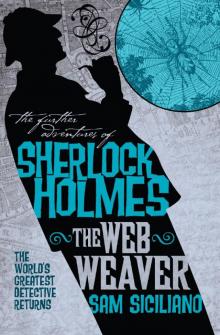 The Web Weaver
The Web Weaver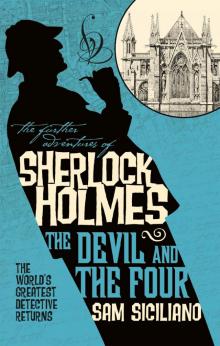 The Further Adventures of Sherlock Holmes--The Devil and the Four
The Further Adventures of Sherlock Holmes--The Devil and the Four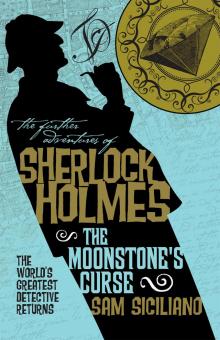 The Moonstone's Curse
The Moonstone's Curse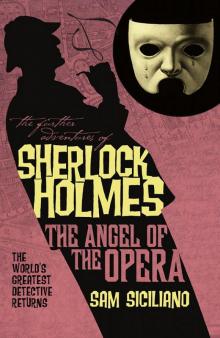 The Angel of the Opera
The Angel of the Opera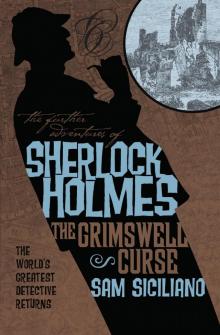 The Grimswell Curse
The Grimswell Curse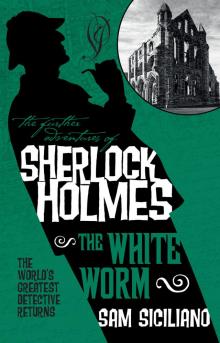 The White Worm
The White Worm